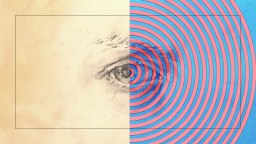There is so much more going on in your sleep than you think.
In his first video for Big Think, Dr Emeran Mayer – gastroenterologist and author of The Mind-Gut Connection – described what is called our “second brain”. The gut is no ordinary body system; it’s intelligent and independent, in that it consists of about 100 million nerve cells sandwiched between layers of the gut running all the way from the esophagus to the end of the large intestine. This ‘second brain’ in our gut, and our regular brain use the same neurotransmitters and are connected through neural, endocrine, and immune pathways, so it truly is an integrated intelligent system with information flowing in both directions.
This becomes interesting when you start asking questions about sleep and its relationship to health. We all know sleep is vital to bodily function, but usually we’re focused on our mind activity. What are we dreaming about? Are we processing the day’s emotional turbulences? Are we getting enough sleep to let the brain do its thing?
Dr. Mayer explains that your gut is also critically important during sleep, and is affected by your sleep patterns. When you fall asleep and your stomach is empty, your gut commences 90-minute cycles of intense contractile waves that migrate from your esophagus all the way down to the end of your large intestine. It’s a cleaning process that removes residue from the gut and keeps microbial bacteria in check. We’ve always known that missing out on sleep makes us foggy-headed and far from our best selves in terms of cognition, but if our sleep is disturbed or we aren’t getting enough of it, or we are eating too much in the night, the gut won’t have a chance to properly clean itself. Left unregulated, bacteria will develop into abnormal colonies, the health implications of which can be enormous.
What’s more, Mayer points out that, in a way, your gut dreams too. Just as the expressions on your face reveal your internal emotions, your gut is equally reflective of your daily ups and downs – whether it takes the form of butterflies, nervous bowels, emotional nausea, or more subtle physiological changes that fly under the radar. And just as an event that didn’t really seem important in the daytime can completely take over your dreams at night, your gut too is encoded with these experiences and must digest them. “Many of these memories have a gut-feeling component because every time we have an emotion during the day there’s always a counterpart at the gut level that, through these sensory pathways, goes back to the brain.” During sleep, memories are retrieved and processed in the brain, which includes re-living the corresponding gut feelings we had during the day.
With this insight, one has a whole new appreciation for the gut or “second brain”, and its nocturnal mechanisms are a fascinating and urgent reminder that sleep is more important than ever.
Dr Emeran Mayer’s most recent book is The Mind-Gut Connection: How the Hidden Conversation Within Our Bodies Impacts Our Mood, Our Choices, and Our Overall Health
.
Emeran Mayer: So when we sleep and we have an empty stomach then the activity, the contractile activity of our gut changes to a very unique pattern. It’s a 90-minute cycle, very powerful waves of contractions migrate from the esophagus all the way down to the end of our large intestine. And they move very slowly. So this has been referred to as the intestinal housekeeper that sort of cleans the gut from any residue that’s present. And the rhythm for that is generated by the brain so it’s dependent on the input of the vagus nerve on the second brain in the gut. And this has been something that also should occur when during daytime when in between meals when our stomach and intestinal system is empty.
However with the sort of modern habit of snacking in between meals so a lot of people don’t have that during the day but have it during sleep. If you add the microbes into this now it’s quite likely, not really proven. I mean the microbes obey some kind of a Circadian rhythm by themselves so they’re different during sleep and during daytime. But it’s quite possible to assume that this powerful wave that sort of cleans everything out will also affect the microbes, the composition of the microbes because if we don’t have it – so people that don’t have that for some reason they will develop abnormal colonization, for example, of their small bowel with a lot of microbes that don’t really belong there. So clearly an important role in regulating the populations and the regional distribution of these microbes in our gut. What happens during sleep, so during REM sleep when we have a lot of activity going on within the autonomic nervous system circuits within the brain and the signals are being sent to the gut. So our body is inhibited but not our intestinal activity.
So in many ways emotions that we experience usually in our dreams have their mirror image in terms of gut activity – contractions, secretions. And again I mean like everything that goes on within our brain emotionally always is reflected just like our facial expression reflects our emotions, everything reflects our emotional state either during waking time or sleep time at the gut level. And the microbes who live in that environment are affected by it. So it’s an area that’s not studied in great detail but very important for an understanding of how the microbes, the gut and the brain interact and maintain health. So sleep is a very important ingredient for health regulation of the immune system but for the also regulation of gut function and particularly gut microbial integrity and wellbeing.
We know quite a bit about what happens during sleep and during dreaming. In psychoanalysis this is a big window into our emotional lives so Jungian or Freudian psychoanalysts have spent a lot of time interpreting dreams and getting an access to this process. A big portion is probably the processing and consolidation of memories that have been experienced during the day. Many of these memories have a gut feeling component because every time we have an emotion during the day there’s always a counterpart at the gut level that is then through these sensory pathways goes back to the brain. We may not experience it during the daytime but it’s encoded in this vast database within the brain. So what happens then during sleep there is this retrieval and then processing and consolidation of these memories including all the gut feelings that are associated with those experiences that we had during the day.
I think it’s a very important point to emphasize that emotions have an intricate component of gut activity and gut feelings regardless if you feel it like the butterflies in the stomach or the knot in the stomach. Every emotion has a component that the brain engages gut activity and that’s being reported back to the brain. And so you have to look at an emotion really as a circular process within the brain-gut access. And during sleep and during dreaming there’s almost certainly a consolidation processing of this myriad of gut feelings that are generated throughout the day.






